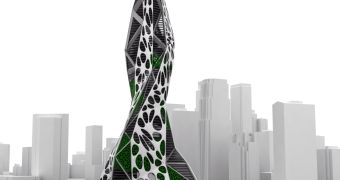Nowadays, the existing agricultural land is not enough to respond to the needs of 7 billion people. Lack of resources has increased deforestation rates, accelerating climate change and putting ecosystems at risks.
However, to address this issue, eco-friendly designers and architects are trying to introduce sustainable concepts, seeking to make urban farming much more popular.
The green rooftops and vertical gardens cleverly placed in small apartments are nothing new and definitely not as spectacular as a prototype unveiled by Connor Nicholas, an architect from Savannah.
He has imagined a tower, placed in a dense urban area, combining the functionality of any kind of modern building with the advantages of a complex urban farm.
The giant bottle-like structure is suggestively entitled the 'Polyculture Tower,' revealing how different farming systems can be properly exploited by developers under the same roof, with a minimal impact on the environment and a strict zero-emission standard.
“This tower encompasses a production system based on the agricultural concept of polycultures. Polycultures are closed farming systems where there are multiple organisms being raised and sustained in one micro-ecosystem. Through this process one can easier control the life systems therefore producing more organic and environmentally conscious food production,” explains the developer.
A building with a zero carbon footprint would become an essential asset for a coal-free future. However, this implies that the Tower would have to be powered entirely by renewable sources and grid-independent.
The spectacular design is also a major plus, attracting potential investments, coming from design enthusiasts.
Apart from its awesome urban look, the building displays an increased utility, making food production more sustainable.
The amazing Polyculture Tower is not the only revolutionary concept unveiled by the talented architect, clearly manifesting his passion for three-dimensional structures, strategically placed in urban environments.
The 'Urban Sponge' or the 'Tea House Pavilion' also count as a good proof that eco-conscious design is truly beautiful and practical, at the same time.

 14 DAY TRIAL //
14 DAY TRIAL //